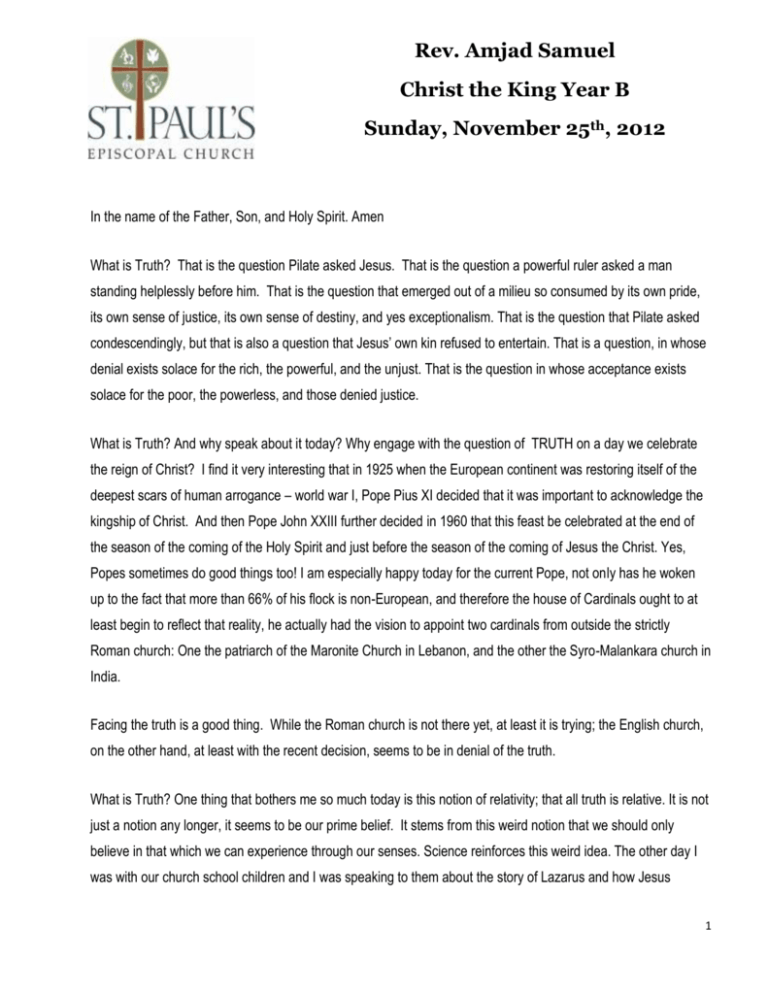Christ the King Year B - St. Paul`s Episcopal Church
advertisement

Rev. Amjad Samuel Christ the King Year B Sunday, November 25th, 2012 In the name of the Father, Son, and Holy Spirit. Amen What is Truth? That is the question Pilate asked Jesus. That is the question a powerful ruler asked a man standing helplessly before him. That is the question that emerged out of a milieu so consumed by its own pride, its own sense of justice, its own sense of destiny, and yes exceptionalism. That is the question that Pilate asked condescendingly, but that is also a question that Jesus’ own kin refused to entertain. That is a question, in whose denial exists solace for the rich, the powerful, and the unjust. That is the question in whose acceptance exists solace for the poor, the powerless, and those denied justice. What is Truth? And why speak about it today? Why engage with the question of TRUTH on a day we celebrate the reign of Christ? I find it very interesting that in 1925 when the European continent was restoring itself of the deepest scars of human arrogance – world war I, Pope Pius XI decided that it was important to acknowledge the kingship of Christ. And then Pope John XXIII further decided in 1960 that this feast be celebrated at the end of the season of the coming of the Holy Spirit and just before the season of the coming of Jesus the Christ. Yes, Popes sometimes do good things too! I am especially happy today for the current Pope, not only has he woken up to the fact that more than 66% of his flock is non-European, and therefore the house of Cardinals ought to at least begin to reflect that reality, he actually had the vision to appoint two cardinals from outside the strictly Roman church: One the patriarch of the Maronite Church in Lebanon, and the other the Syro-Malankara church in India. Facing the truth is a good thing. While the Roman church is not there yet, at least it is trying; the English church, on the other hand, at least with the recent decision, seems to be in denial of the truth. What is Truth? One thing that bothers me so much today is this notion of relativity; that all truth is relative. It is not just a notion any longer, it seems to be our prime belief. It stems from this weird notion that we should only believe in that which we can experience through our senses. Science reinforces this weird idea. The other day I was with our church school children and I was speaking to them about the story of Lazarus and how Jesus 1 brought him back to life. This was right after they had celebrated Halloween. So I asked a very dumb question, “How many of you believe that Jesus can bring people back from the dead?” Most raised their hands; but there was one 11 year old who did not. So I asked, “How many of you do not believe that Jesus can bring people back to life and why?” This young man was glad to be acknowledged, so he raised his hand. I asked him to respond and he said, “I have two reasons: first, they did not have machines back then” – referring to life saving technologies – “and the second is that I am just not a very religious person!” As a response to this statement I asked these kids, “How many of you have dogs?” Most raised their hands. Then I said, “How many of you know that dogs cannot see in color?” Again, a good number of the hands went up. So then I said, “what if the dog starts thinking that since it cannot see color, therefore color does not exist; would that be a correct and factual statement?” There was silence in the room! You see the young man was right, it was his admission that the prime reason he cannot accept that Jesus has control over life and death is not because this question can be somehow proved empirically one way or the other, but that the context in which he finds himself in, does not wish to accept that fact, no matter how overwhelming the evidence just may be! Today, I believe, we live in a context in which all truth is relative. Just go to a Bible Study or a faith discussion group and it becomes all so evident. In our quest to find the relevance of our faith to where we are in life, time, history, and place, we almost inevitably begin our reflections by the words, “I think” or “For me” or “In my life”. These words are meant to convey our humility, but what they do is, they limit The Truth of our faith to a specific context, and tie it down so firmly to a specific situation that in the end, the relativity of the truth overshadows the Truth itself. And when it is done over and over again to the point that it becomes the core fiber of our cultural fabric, the notion of an absolute truth is completely lost. And then we hear expressions like, “what may be true for you may not be true for someone else”. With that we are all set for a culture that is either agnostic, atheist, or even pantheist. Is that process of devolution uniquely modern? No, Daniel sees four beasts in his vision. The vision of John in the book of Revelation struggles with similar contextual issues. Yet, ultimately, both point to the one absolute truth. Interestingly, they both do it by shattering the boundaries of relativity. They both speak of time as unending and from time immemorial; the alpha and the omega! They both speak of ALL nations and ALL peoples, and ALL tribes, and ALL languages, everyone to recognize and acknowledge one truth; the reign of the Son of Man; Jesus our Christ. 2 Interestingly, relativity has no place in Daniel’s vision, or in John’s vision. It is the lack of relativity that makes the truth of Jesus Christ absolute and THE TRUTH. Jesus himself rejects being locked into a specific context and says very clearly, “My kingdom is not from this world, it is not from here”! It is not a relative concept! It is not something that we can dismiss so lightly by saying, “it is true for me but may be not for you.” We cannot preface it with words like, “I think”, or “for me” or “for my life”. True humility is not in making truth relative, but in accepting the truth that is beyond the confines of time and space; and that, through faith, we know is Jesus Christ, the son of man, to which all old and new scriptures testify. Again, I know it is easier said than done in a highly relativized world. How many of you are aware that when you search for something in Google, you get a very relative answer? Well, you do! That is what the search engine technology is all about: to learn about you, and to relate all the answers as best as it can to your likes and preferences. In other words, when you Google something, the response you get is the response you want to get! That is why you keep going back to Google! Because it reaffirms you! In the church today, that comes under the realm of pastoral care. Why? Because we have a society that is so geared to being reaffirmed. In such a context, I confess, it is very hard to speak about the absolute truth, much less encourage others and even each other to belong to that truth. Yet when we do, we are able to listen to Jesus’ voice, as is His promise. When we belong to this timeless truth, we are able to find the peace that surpasses human understanding. When we belong to this truth that transcends a people, and their culture, our doors begin to open and our spaces get filled up with all kinds of people. Yes, we at St. Paul’s are a living testimony of that opening up, that shattering of boundaries, that experience of the Alpha and the Omega. Yes, our doors are opening. People from all walks of life, social classes, color, and race are now filling up our assembly hall every week. It is not because Diane Rosenberg’s management is exceptional, or because Suzzane Smaltz’s reaching out is par excellence, or because St. Paul’s is blessed with some pretty fine chefs; no, all that is true, but the Assembly Hall is not filling up every week for these reasons. It is filling up because we are very particular that we are not going to shy away from the Truth of Jesus. We pray with everyone and anyone who seeks prayer. We ask God to give us listening ears, we ask the Holy Spirit to enable us to speak the language of love, through our actions, and yes through our words too. We ask for Jesus’ presence in all that we do. We share the good news of our faith. We try our best to live the Gospel of Christ. 3 And sharing the good news of Christ, through service, through listening, through praying, through being agents of laughter and comfort, through becoming instruments of peace and healing, is evangelism, because it is living out the Good News of the Gospel. I thank God that in this short time of about two months, where we have shared the good news of Christ with all kinds of people, we have also witnessed, through our own actions the true meaning of being evangelists. By an estimate, some 100 of our parishioners have had the opportunity to live out the Gospel, to be servants of Christ, to be evangelists. There is another door opening for us here at St. Paul’s and I ask for all of us to pray for it. Last year we revived Barnabas Ministry here at St. Paul’s. Deacon Harvey, Peter DiMezza, Wayne Rice, Eric Huebschman, Joni Murgatroyd and Matt Conant labored hard to envision this ministry and to implement it. This year, by the grace of God, Trinity Lutheran, Faith Lutheran, Church of Our Savior, Rocky Knoll, and St. Hilary’s will join us in making this ministry reach even farther. While I thank God for bringing His flock together to share The Truth, I ask for your prayers. I ask for prayers because it is at times of such full disclosure of The Truth, that Pilate asked, “What is Truth?” I ask for prayers because it is when reconciliation unfolds, healing unleashed, justice pronounced, and the reign of Christ evangelized, that the powers of this world rise up to defend their limited and relative dominions. May we never, even in a time of trial, shy away from living in the fullness of Christ. Amen. 4







